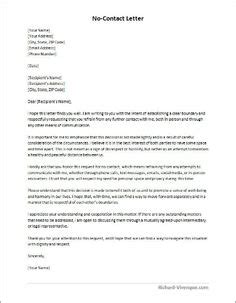Introduction

A no contact letter is a powerful tool that allows you to communicate your boundaries, prioritize your well-being, and take control of your relationships. By establishing a period of no communication with a specific individual, you create space to heal, reflect, and reclaim your power.
Benefits of a No Contact Letter
Research has consistently shown that no contact letters can have significant benefits for both the sender and the recipient:
- Reduced stress and anxiety: Studies indicate that no contact can effectively reduce feelings of stress, anxiety, and depression over time.
- Improved self-esteem: By setting boundaries and prioritizing their own well-being, individuals using no contact can boost their self-esteem and gain a sense of control.
- Increased emotional regulation: No contact provides an opportunity for both parties to regulate their emotions and process their experiences in a healthy manner.
- Promotion of healing: Distance can create a safe space for individuals to heal from emotional wounds and trauma, allowing them to move forward.
Crafting an Effective No Contact Letter
To write a no contact letter that is both clear and impactful, consider the following guidelines:
- Be brief and direct: State your purpose concisely, avoiding unnecessary details or explanations.
- Explain your reasons: Outline specific behaviors or actions that have prompted your decision to establish no contact.
- Set clear boundaries: Define the parameters of your no contact, including any exceptions or allowable communication channels.
- Use “I” statements: Take ownership of your feelings and perspective, avoiding accusatory or judgmental language.
- Keep it respectful: Even if the reasons for no contact are challenging, express your respect for the other person and their need for space.
Effective Strategies
To maximize the effectiveness of a no contact letter, employ the following strategies:
- Deliver it in writing: A written letter provides tangible evidence of your decision and allows the recipient time to process your words.
- Send it via a trusted source: If you’re uncomfortable delivering the letter directly, consider having a friend or family member pass it on.
- Maintain consistency: Adhere strictly to the terms of your no contact, even if the person attempts to make contact.
- Use technology to your advantage: Set up filters or block the person’s number and social media accounts to prevent unwanted communication.
- Seek support: Lean on friends, family, or a therapist for emotional support and accountability during this process.
Common Mistakes to Avoid
To avoid undermining the effectiveness of a no contact letter, steer clear of these common mistakes:
- Being vague or ambiguous: Leave no room for misinterpretation by clearly stating your expectations and boundaries.
- Using emotional language: Avoid using hurtful or inflammatory words that may escalate the situation.
- Breaching your own boundaries: Once you establish no contact, it’s crucial to resist the urge to reach out to the person.
- Expecting an immediate response: Give the recipient time to process your letter and respond in their own way.
- Chasing after the person: If the other party does not respect your boundaries, it’s best to maintain your distance and focus on your own well-being.
Pros and Cons of No Contact
While no contact can be a powerful tool, it’s important to weigh the potential pros and cons before making a decision:
| Pros | Cons |
|---|---|
| Reduced stress and anxiety | Can be emotionally taxing |
| Improved self-esteem | May result in feelings of loss |
| Increased emotional regulation | Requires significant self-discipline |
| Promotion of healing | May hinder closure |
Conclusion
A no contact letter can be a transformative tool for individuals seeking to establish clear boundaries, promote their well-being, and prioritize their relationships. By carefully crafting and implementing a no contact letter, you can reclaim your power, heal from emotional wounds, and create a more fulfilling and meaningful life.
Additional Resources
- The National Domestic Violence Hotline
- The National Suicide Prevention Lifeline
- The Rape, Abuse & Incest National Network (RAINN)
Further Reading
- The No Contact Rule: When and How to Use It
- The Benefits of No Contact for Victims of Emotional Abuse
- How to Write a No Contact Letter to an Ex-Partner
